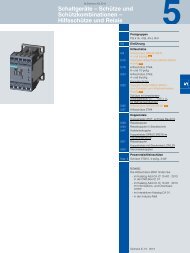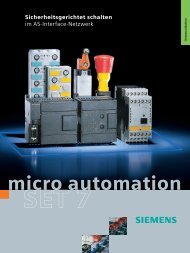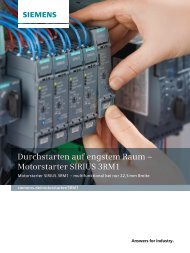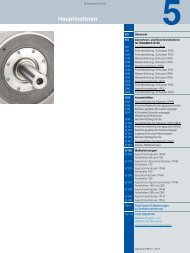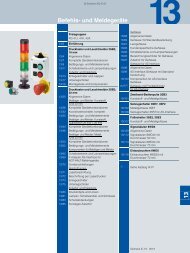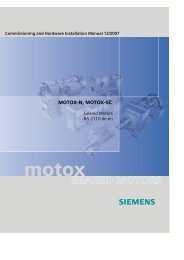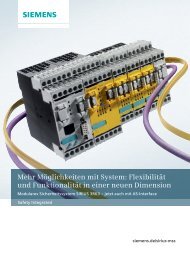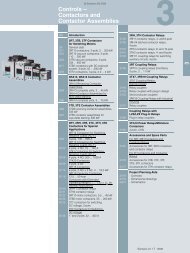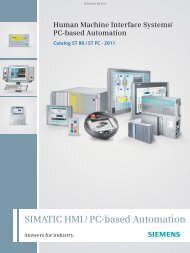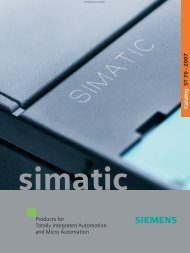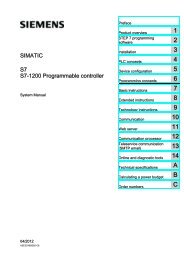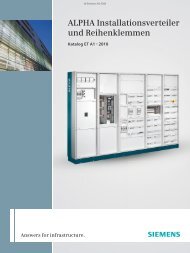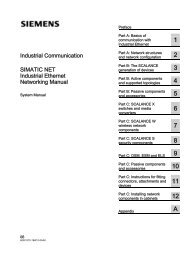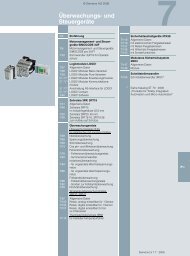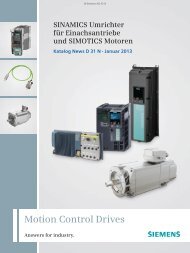Catalog ST PCS 7.1 - September 2005
Catalog ST PCS 7.1 - September 2005
Catalog ST PCS 7.1 - September 2005
You also want an ePaper? Increase the reach of your titles
YUMPU automatically turns print PDFs into web optimized ePapers that Google loves.
■ Overview<br />
In practice, conventional PID controllers are often operated in<br />
the manual mode because the control quality achieved does not<br />
match the expectations. The reason for this is that the controllers<br />
are either badly adjusted or the processes are difficult to control<br />
with PID controllers, e.g. temperature systems, processes with<br />
any proportion of dead time component, or processes that<br />
change depending on time or operating point. In addition, the<br />
optimum setting of PID controllers demands special experience<br />
and is very time-consuming.<br />
A recommended alternative for solving these problems is the adaptive<br />
ADCO controller. It works on the basis of a process model<br />
that is determined in the background during the setting procedure.<br />
With the aid of this process model, ADCO can predict the<br />
consequences of an intervention in the process (predictive controller),<br />
e.g. what effect the opening of a steam valve up to a certain<br />
extent has on the process temperature. Conversely, it is also<br />
in a position to determine the valve setting required for achieving<br />
or maintaining a defined temperature. With the process model,<br />
ADCO has more process information at its disposal than conventional<br />
controllers and uses this to improve the quality of control.<br />
Multi-range controller for non-linear systems<br />
ADCO is also available as a multi-range controller (ADMR). The<br />
special feature of this type of controller is that the control range<br />
can be divided into as many as 8 zones which can be individually<br />
optimized. The switchover between the zones can be automatic<br />
or event-based.<br />
ADCO faceplate with detail area for alarm limits / batch<br />
Advanced Process Control<br />
ADCO: Adaptive controller<br />
■ Application<br />
The adaptive controller ADCO can be used as a better alternative<br />
to the conventional PID controller, in particular for processes<br />
that are difficult to control. This has the following advantages:<br />
• about 10 to 20 % saving of time in the commissioning phase<br />
due to the fast and robust controller setting<br />
• significantly better control quality for difficult processes<br />
• very good adaptability, especially where there are changes to<br />
the process characteristics<br />
• significant reductions in transmission times in the case of status<br />
transitions in batch processes (e.g. heating a product from<br />
temperature level A to level B)<br />
■ Technical specifications<br />
Hardware requirements SIMATIC <strong>PCS</strong> 7 V5.x with AS 41x<br />
automation systems<br />
Memory requirement 21 KB (once only)<br />
+ 5 KB (per controller)<br />
Computing time about 2 ms (S7-416)<br />
■ More information<br />
i.p.a.s.-systeme<br />
An der Landwehr 6<br />
60437 Frankfurt, Germany<br />
Tel.: +49 69 950418-0<br />
Fax: +49 69 950418-19<br />
E-mail: service@ipas-systeme.de<br />
Additional information is available in the Internet under:<br />
http://www.ipas-systeme.de<br />
Siemens <strong>ST</strong> <strong>PCS</strong> <strong>7.1</strong> · <strong>September</strong> <strong>2005</strong><br />
3/5<br />
3



